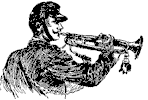


In 1862, during the Civil War, a Union Army captain, Robert Ellicombe, was with his men near Harrison's Landing in Virginia. Confederate soliders were camped on the other side of a narrow strip of land.
In the night, the captain heard a moan and looked out onto that strip and saw a wounded soldier laying there. He decided to bring him back to camp for medical attention so he crawled out on his stomach until he reached him. To his suprise he discovered that the soldier was from the Confederate Army and that now, he was dead.
The captain lit a small lantern to see better and his breath was taken from him. Laying before him was his son.
The young man had been studying MUSIC in the south when the war broke out and without telling his father, enlisted in the Confederate Army.
The following morning, the captain asked his superiors permission for a full military burial, despite his sons status as the "enemy". His request was partially granted and was told to make it small and quiet.
He asked for a group of the Army's band to play at the service but was denied saying they could not spare anyone. But was granted ONE band member.
He chose a bugler and asked him to play a series of musical notes that he had found in his sons uniform pocket.
That music is the haunting melody that we now know, as "Taps".



The story below is taken from the pages of the Arlington National Cemetery Official Website
During the Civil War, in July 1862 when the Army of the Potomac was in camp, Brig. Gen. Daniel Butterfield summoned Pvt. Oliver Wilcox Norton, his brigade bugler, to his tent. Butterfield, who disliked the colorless "extinguish lights" call then in use, whistled a new tune and asked the bugler to sound it for him. After repeated trials and changing the time of some notes which were scribbled on the back of an envelope, the call was finally arranged to suit Gen. Butterfield and used for the first time that night. Pvt. Norton, who on several occasions, had sounded numerous new calls composed by his commander, recalled his experience of the origin of "Taps" years later:
"One day in July 1862 when the Army of the Potomac was in camp at Harrison's Landing on the James River, Virginia, resting and recruiting from its losses in the seven days of battle before Richmond, Gen. Butterfield summoned the writer to his tent, and whistling some new tune, asked the bugler to sound it for him. This was done, not quite to his satisfaction at first, but after repeated trials, changing the time of some of the notes, which were scribbled on the back of an envelope, the call was finally arranged to suit the general.
"He then ordered that it should be substituted in his brigade for the regulation "Taps" (extinguish lights) which was printed in the Tactics and used by the whole army. This was done for the first time that night. The next day buglers from nearby brigades came over to the camp of Butterfield's brigade to ask the meaning of this new call. They liked it, and copying the music, returned to their camps, but it was not until some time later, when generals of other commands had heard its melodious notes, that orders were issued, or permission given, to substitute it throughout the Army of the Potomac for the time-honored call which came down from West Point.
In the western armies the regulation call was in use until the autumn of 1863. At that time the XI and XII Corps were detached from the Army of the Potomac and sent under command of Gen. Hooker to reinforce the Union Army at Chattanooga, Tenn. Through its use in these corps it became known in the western armies and was adopted by them. From that time, it became and remains to this day the official call for "Taps." It is printed in the present Tactics and is used throughout the U.S. Army, the National Guard, and all organizations of veteran soldiers.
Gen. Butterfield, in composing this call and directing that it be used for "Taps" in his brigade, could not have foreseen its popularity and the use for another purpose into which it would grow. Today, whenever a man is buried with military honors anywhere in the United States, the ceremony is concluded by firing three volleys of musketry over the grave, and sounding with the trumpet or bugle "Put out the lights. Go to sleep"...There is something singularly beautiful and appropriate in the music of this wonderful call. Its strains are melancholy, yet full of rest and peace. Its echoes linger in the heart long after its tones have ceased to vibrate in the air."


| Site Map of life in The Slow Lane |
